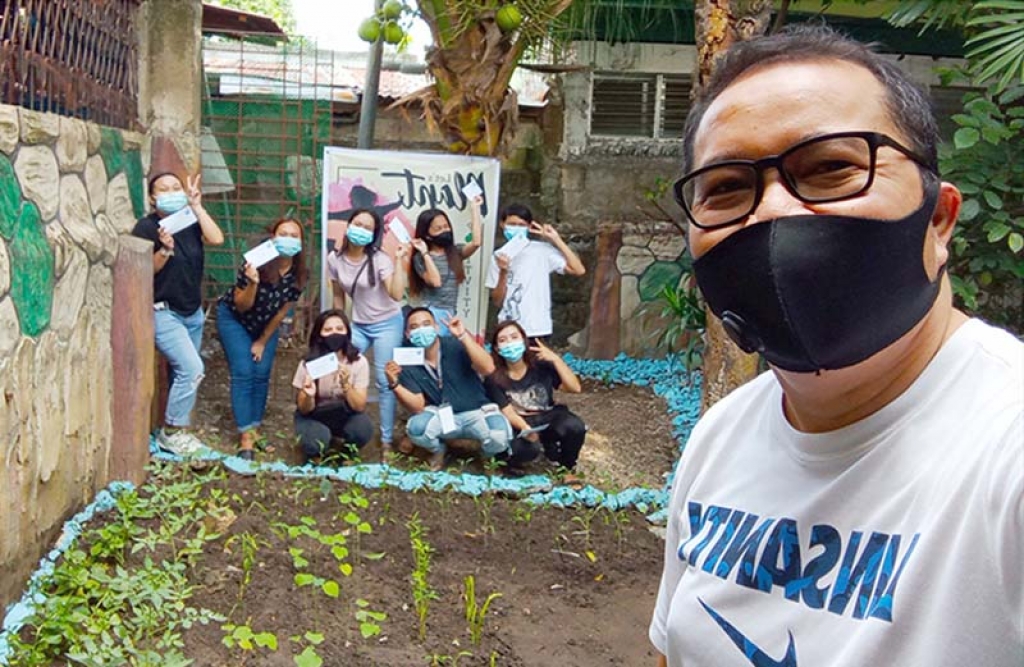PHILIPPINES: Salesian Youth Center at Our Lady of Lourdes Parish launches the #Let’sPlantPositivity initiative to promote urban agriculture

(MissionNewswire) The Salesian Youth Center at Our Lady of Lourdes Parish in Cebu, Philippines, has launched the #Let’sPlantPositivity initiative, a challenge to promote urban agriculture among youth. The initiative was organized by the Parochial Youth Coordination Council, led by Salesian Father Abundio Bacatan, the new director for youth.
Started on July 9, youth were challenged to grow fruit and vegetables at home to teach them the various stages of cultivation, to help them fight the negativity caused by the pandemic, and to reflect on Pope Francis’ encyclical “Laudato Sì,” which was inaugurated on May 18, commemorating the fifth anniversary of the publication of his eco-encyclical with the same title. At the end of the challenge, the eight youth who had done the best job with their project received gift vouchers.
Cultivation of food at home and at local farms has been critical during the pandemic. Many locations have seen food shortages, and families have lost income and can no longer buy food. Don Bosco Training Center in Mati, the capital city of the province of East Davao, located on the southeastern side of the island of Mindanao, also launched an agricultural project to deal with the quarantine period due to the COVID-19 pandemic.
Under the guidance of Father Rex Carbilledo, the director of the vocational-technical training center, the soil was prepared for cultivation and the first vegetables were planted. Salesians are planting eggplants, okra, lettuce, sweet potatoes, cassava, onions, ginger and sweet corn. The goal was to provide organic and affordable vegetables to the local population and neighboring communities, and to teach them cultivation and farming techniques.
“Providing an opportunity to cultivate the land during this time is important for ensuring that local populations have a source of food and are learning the farming techniques to help make their farms more productive,” said Father Gus Baek, director of Salesian Missions, the U.S. development arm of the Salesians of Don Bosco. “Missionaries provide education and workforce development paired with other social services to help poor youth break the cycle of poverty and have hope for the future.”
Since 1950, Salesian Missions has been providing crucial help in the Philippines—working with at-risk youth, impoverished families and disaster victims. Humanitarian agencies warn of the dangers faced by the most disadvantaged children in the Philippines. According to UNICEF, there are at least 1.2 million children between the ages of 5 and 15 who are out of school and are being left behind. In addition, children born into the poorest 20 percent are almost three times more likely to die during their first five years as those from the richest 20 percent.
Salesian missionaries, supported by funding from Salesian Missions, were at the forefront of disaster relief during reconstruction after the Nov. 8, 2013 Super Typhoon Haiyan (locally known as Yolanda) devastated the country. According to United Nations estimates, 11.5 million people were affected by Haiyan and close to 1 million were displaced. More than half a million were homeless and living in the streets among the debris. Salesian missionaries mobilized all resources and efforts to aid the victims of this and other disasters.
###
Sources:
ANS Photo (usage permissions and guidelines must be requested from ANS)
ANS – Philippines – #Let’sPlantPositivity: a challenge to promote urban agriculture among young people
Don Bosco Training Center Mati
Our Lady of Lourdes Parish in Cebu
PHILIPPINES: Don Bosco Center Mati launches new farming initiative in response to COVID-19 pandemic
Salesian Missions – Philippines
UNICEF – Philippines





